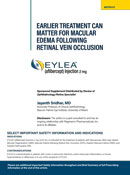Take-home points
|
 |
|
Bios Mr. Moir is a fourth-year medical student at the University of Chicago Pritzker School of Medicine. Dr. Gonnah is a second-year surgical vitreoretinal fellow in the department of ophthalmology and visual science at the University of Chicago. Dr. Yehia is a first-year surgical vitreoretinal fellow in the department of ophthalmology and visual science at the University of Chicago. Dr. Skondra is an associate professor specializing in vitreoretinal disease and surgery in the department of ophthalmology and visual science at the University of Chicago. DISCLOSURES: Mr. Moir, Dr. Gonnah and Dr. Yehia have no relevant disclosures. Dr. Skondra disclosed relationships with Biogen, Allergan/AbbVie, Focuscope, LaGrippe Research, Keywest Health, Lumina and Trinity Life Sciences. |
Intravitreal anti-VEGF agents have revolutionized the treatment of wet age-related macular degeneration, but treatment options for the dry form have remained scarce.1 Retina specialists have been largely restricted to recommending AREDS2 vitamins and minerals to prevent progression to advanced AMD along with recommending pertinent lifestyle interventions, such as smoking cessation.2
This year, the Food and Drug Administration approved two treatments for treatment of dry AMD: intravitreal pegcetacoplan (Syfovre, Apellis Pharmaceuticals), which was shown to mildly slow the progression of geographic atrophy;3 and, more recently, avacincaptad pegol (Izervay, Iveric Bio/Astellas), which demonstrated a statistically significant reduction in GA progression.4
However, no medication is known to prevent disease progression regardless of staging. This is a notable shortcoming, considering that the dry AMD accounts for approximately 90 percent of all AMD cases and can slowly progress to GA, which causes permanent central vision loss.
Furthermore, wet AMD accounts for 80 to 90 percent of all blindness related to AMD. However, treatments with recurrent injections may present uncomfortable burdens to patients, and few if any interventions exist to prevent or delay conversion to wet AMD.5
Hence, an ideal medication would prevent the onset of AMD entirely or prevent its progression to advanced and debilitating stages of disease, all while offering safety and ease of use to patients. That has inspired some researchers to evaluate the potential of using metformin for management of AMD.
Metformin’s expanding use
Metformin is a first-line oral medication for treating type 2 diabetes. In recent years, its off-label use has expanded for treating polycystic ovarian syndrome, gestational diabetes and prediabetes, and for managing the metabolic effects from antipsychotic medications.6 Part of this growing therapeutic range is attributable to its benign side-effect profile. Metformin isn’t associated with a risk of hypoglycemia and is generally well-tolerated.6
Also emerging is evidence of metformin’s potential geroprotective properties. Metformin may have an anti-aging effect through its interactions with age-related cellular pathways, and its use has been shown to decrease mortality from dementia, cancer and cardiovascular disease.7
Metformin’s beneficial anti-aging associations, expanding therapeutic use and safety profile have inspired researchers to explore its possible connections with AMD.
 |
Possible mechanism for metformin in AMD
While the pathogenesis of AMD is multifactorial and isn’t completely characterized, complement, angiogenic, oxidative stress, lipid, extracellular matrix and inflammatory pathways all contribute.8 Metformin may interact with these pathways to modulate prevention or delay the progression of AMD through several plausible mechanisms.
Metformin acts through activation of AMP-activated protein kinase (AMPK), which is responsible for inhibition of glucose production in hepatocytes.9 AMPK downregulates mammalian target of rapamycin (mTOR), a kinase that plays a key role in aging, and inhibition of mTOR can extend the lifespan of mammalian model organisms.10
Through AMPK-dependent and independent pathways, metformin also reduces levels of reactive oxygen species and pro-inflammatory cytokines while enhancing autophagy and delaying stem cell aging.11 These findings help to explain metformin’s purported anti-aging properties.
Within retinal tissue, metformin exhibits antiangiogenic and anti-inflammatory properties,12 protects against oxidative stress13 and augments autophagy-mediated removal of damaged RPE cells.14
Given the considerable overlap between the pathways on which metformin acts and the pathways responsible for the development of AMD, researchers have turned their attention to observational studies to determine whether metformin may protect against AMD.
The observational evidence supporting the potential of metformin in AMD
• Emily Brown, MD, and colleagues at the University of Florida were the first group to perform an observational study of the association between metformin and AMD.21 In a case-control study of 1,947 cases of incident AMD and 5,841 controls, they found exposure to metformin decreased the odds of developing any AMD (odds ratio [OR]=0.58; 95% confidence interval [CI]=0.43-0.79). • A retrospective cohort study in Taiwan corroborated this finding among 68,205 patients with type 2 diabetes.16 In a propensity score-matched sample, those exposed to metformin were less likely to develop any AMD (hazard ratio [HR]=0.57; 95% CI=0.52-0.63). The researchers found a significant trend of lower hazard of AMD development with increasing total and average daily dosing of metformin. • A cross-sectional retrospective study of 3,120 diabetes patients at the University of California, San Francisco found that patients taking metformin were less likely to have any AMD (OR=0.70; 95% CI=0.55-0.88), including dry AMD only (OR=0.59; 95% CI=0.46-0.77).22 • In a nationwide case-control study in the United States that featured more than 300,000 AMD cases and 300,000 matched controls, Andrea Blitzer, MD, and colleagues at the University of Chicago found that metformin reduced the odds of any AMD development (OR=0.94; 95% CI=0.92-0.96).15 This protective effect showed the greatest benefit at lower doses, particularly cumulative doses of 1 to 270 g and 271 to 600 g over a two-year period. Notably, the study showed a protective effect in diabetes patients without retinopathy (OR=0.93; 95% CI=0.91-0.95) but not in diabetes patients with diabetic retinopathy. • A small retrospective cohort study of 324 patients diagnosed with type 2 diabetes in Beijing reported that metformin users were less likely to develop any AMD (OR=0.24; 95% CI=0.13–0.42) and early AMD (OR=0.18; 95% CI=0.10-0.33), but not less likely to develop late AMD (OR=0.43; 95% CI=0.18-1.04).17 This study also observed a significant trend of decreasing odds of AMD with both prolonged duration of exposure and higher cumulative doses of metformin. However, the small size was a major drawback that severely limited subgroup analysis of AMD stage and metformin dosing. • A large retrospective cohort study of 1 million U.S. patients with diabetes found that active use of metformin conferred an increased hazard of dry AMD (HR=1.08; 95% CI=1.04–1.12).18 Meanwhile, prior use of metformin decreased the hazard of dry AMD (HR=0.95; 95% CI=0.92–0.98). These researchers additionally reported that the quartile with the lowest dosage of metformin had a decreased hazard of dry AMD (HR=0.95; 95% CI, 0.91–0.99). Comparably, those in the highest dosage quartile had an increased hazard of dry AMD (HR=1.07; 95% CI=1.01–1.13). • A retrospective cohort study of 173,689 patients with type 2 diabetes in the United Kingdom found no effect on AMD development in patients prescribed metformin compared to patients prescribed other antidiabetic medications only (HR=1.02; 95% CI=0.92-1.12).23 • A nested case-control study of 2,330 cases of incident AMD and 23,278 matched controls in Korea found no association of metformin with any AMD (OR=1.15; 95% CI=0.91-1.45) or wet AMD (OR=1.03; 95% CI=0.80-1.34), but an increased association with dry AMD (OR=1.62; 95% CI=1.02-2.60).19 • A cohort study of the prospective, Europe-based Rotterdam Study, which included 11,260 participants, reported that metformin was associated with a lower odds of developing AMD (OR=0.69; 95% CI=0.49-0.98).24 This analysis showed that increasing years of treatment or greater daily dosing didn’t further decrease AMD risk. The prospective nature of this study is an important strength relative to the retrospective design of other similar observational studies. |
Implications of the available evidence
Retina specialists should understand how metformin’s effects differ in nondiabetes patients. Three points warrant this additional analysis:
- Prior studies have either exclusively included patients with diabetes or a combination of patients with and without diabetes, making it difficult to parse the effect of metformin from the effect of diabetes on AMD risk.
- Metformin can be taken safely by patients who don’t have diabetes.
- As Andrea Blitzer, MD, and colleagues at the University of Chicago demonstrated, metformin wasn’t protective in patients with diabetic retinopathy, which is generally associated with more severe diabetes.15
 |
With these points in mind, it’s possible that metformin may have the greatest benefit in patients who don’t have diabetes.
Inconsistencies in observational studies
Data behind metformin dosing is still unclear and has been described inconsistently in observational studies. Some studies have described a protective effect with metformin that’s enhanced with greater dosing.16,17 Others have reported an optimal effect at lower doses.15,18 This point requires further investigation as well.
Lastly, only one study has reported the impact of metformin separately on dry and wet AMD.19 Metformin may modulate disease activity differently in these two forms due to unique aspects of their pathogenesis.
It’s crucial to understand if metformin protects against GA, considering its severe and irreversible visual burdens, and if metformin protects against the rapidly progressive wet AMD—both shortcomings in the current literature. An ongoing phase II clinical trial of metformin in nondiabetes patients with GA will shed light on its ability to prevent progression of this debilitating and advanced form of AMD.20
Bottom line
While it’s too early to discern whether metformin will ultimately have a role in the management of AMD, results from multiple observational studies across North America, Europe and Asia are encouraging.
In conjunction with a plausible mechanism that preclinical studies have uncovered, sufficient evidence from observational studies has amassed to warrant testing of metformin in prospective clinical trials. We should eagerly await the results of these trials as they could have the potential to further revolutionize treatment of this debilitating disease. RS
REFERENCES
1. No authors listed. CATT Research Group. Ranibizumab and bevacizumab for neovascular Age-related macular degeneration. N Engl J Med. 2011;364:1897-1908.
2. No authors listed. The Age-Related Eye Disease Study 2 (AREDS2) Research Group. Lutein + zeaxanthin and omega-3 fatty acids for age-related macular degeneration: The Age-Related Eye Disease Study 2 (AREDS2) randomized clinical trial. JAMA. 2013;309:2005-2015.
3. ClinicalTrials.gov. Study to compare the efficacy and safety of intravitreal pegcetacoplan therapy with sham injections in patients with geographic atrophy (GA) secondary to age-related macular degeneration (AMD). Updated June 18, 2023. Available at: https://clinicaltrials.gov/study/NCT03525600. Accessed July 21, 2023.
4. Iveric Bio receives U.S. FDA approval for Izervay (avacincaptad pegol intravitreal solution), a new treatment for geographic atrophy [press release]. Tokyo; Astellas Pharma; August 5, 2023. Available at: https://www.astellas.com/en/news/28281. Accessed September 6, 2023.
5. Ferris FL III, Fine SL, Hyman L. Age-related macular degeneration and blindness due to neovascular maculopathy. Arch Ophthalmol. 1984;102:1640-1642.
6. Corcoran C, Jacobs TF. Metformin. StatPearls [Internet]. StatPearls Publishing; Treasure Island, FL; updated August 17, 2023. Available at: http://www.ncbi.nlm.nih.gov/books/NBK518983/. Accessed July 22, 2023.
7. Mohammed I, Hollenberg MD, Ding H, Triggle CR. A critical review of the evidence that metformin is a putative anti-aging drug that enhances healthspan and extends lifespan. Front Endocrinol. 2021;12:718942.
8. Mitchell P, Liew G, Gopinath B, Wong TY. Age-related macular degeneration. Lancet. 2018;392:1147-1159.
9. Zhou G, Myers R, Li Y, et al. Role of AMP-activated protein kinase in mechanism of metformin action. J Clin Invest. 2001;108:1167-1174.
10. Saxton RA, Sabatini DM. mTOR Signaling in growth, metabolism, and disease. Cell. 2017;169:361-371.
11. Kulkarni AS, Gubbi S, Barzilai N. Benefits of metformin in attenuating the hallmarks of aging. Cell Metab. 2020;32:15-30.
12. Han J, Li Y, Liu X, et al. Metformin suppresses retinal angiogenesis and inflammation in vitro and in vivo. PLoS One. 2018;13:e0193031.
13. Xu L, Kong L, Wang J, Ash JD. Stimulation of AMPK prevents degeneration of photoreceptors and the retinal pigment epithelium. Proc Natl Acad Sci. 2018;115(41):10475-10480.
14. Zhao X, Liu L, Jiang Y, Silva M, Zhen X, Zheng W. Protective effect of metformin against hydrogen peroxide-induced oxidative damage in human retinal pigment epithelial (RPE) cells by enhancing autophagy through activation of AMPK pathway. Oxid Med Cell Longev. 2020;2020:2524174.
15. Blitzer AL, Ham SA, Colby KA, Skondra D. Association of metformin use with age-related macular degeneration. JAMA Ophthalmol. 2021;139:302-309.
16. Chen YY, Shen YC, Lai YJ, et al. Association between metformin and a lower risk of age-related macular degeneration in patients with type 2 diabetes. J Ophthalmol. 2019;2019:1649156.
17. Jiang J, Chen Y, Zhang H, et al. Association between metformin use and the risk of age-related macular degeneration in patients with type 2 diabetes: A retrospective study. BMJ Open. 2022;12:e054420.
18. Eton EA, Wubben TJ, Besirli CG, Hua P, McGeehan B, VanderBeek BL. Association of metformin and development of dry age-related macular degeneration in a U.S. insurance claims database. Eur J Ophthalmol. 2022;32:417-423.
19. Lee H, Jeon HL, Park SJ, Shin JY. Effect of statins, metformin, angiotensin-converting enzyme inhibitors, and angiotensin ii receptor blockers on age-related macular degeneration. Yonsei Med J. 2019;60:679-686.
20. ClinicalTrials.gov. Metformin administration for the minimization of geographic atrophy progression in patients with age-related macular degeneration. Updated June 9, 2023. Available at: https://clinicaltrials.gov/ct2/show/NCT02684578 Accessed June 17, 2023.
21. Brown EE, Ball JD, Chen Z, Khurshid GS, Prosperi M, Ash JD. The common antidiabetic drug metformin reduces odds of developing age-related macular degeneration. Invest Ophthalmol Vis Sci. 2019;60:1470-1477.
22 Stewart JM, Lamy R, Wu F, Keenan JD. Relationship between oral metformin use and age-related macular degeneration. Ophthalmol Retina. 2020;4:1118-1119.
23. Gokhale KM, Adderley NJ, Subramanian A, et al. Metformin and risk of age-related macular degeneration in individuals with type 2 diabetes: A retrospective cohort study. Br J Ophthalmol. 2023;107:980-986.
24. Vergroesen JE, Thee EF, Ahmadizar F, et al. Association of diabetes medication with open-angle glaucoma, age-related macular degeneration, and cataract in the Rotterdam Study. JAMA Ophthalmol. 2022;140:674-681.



